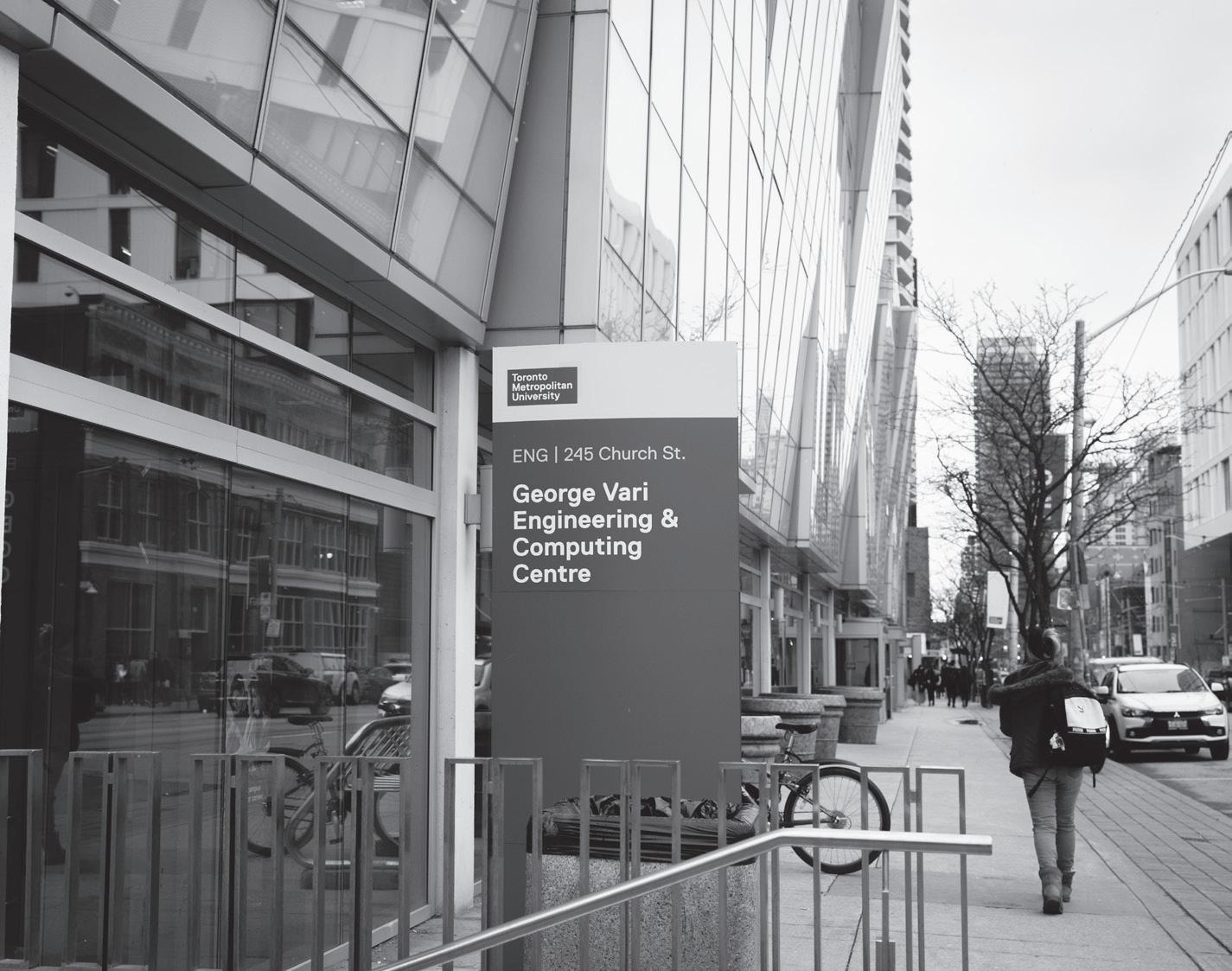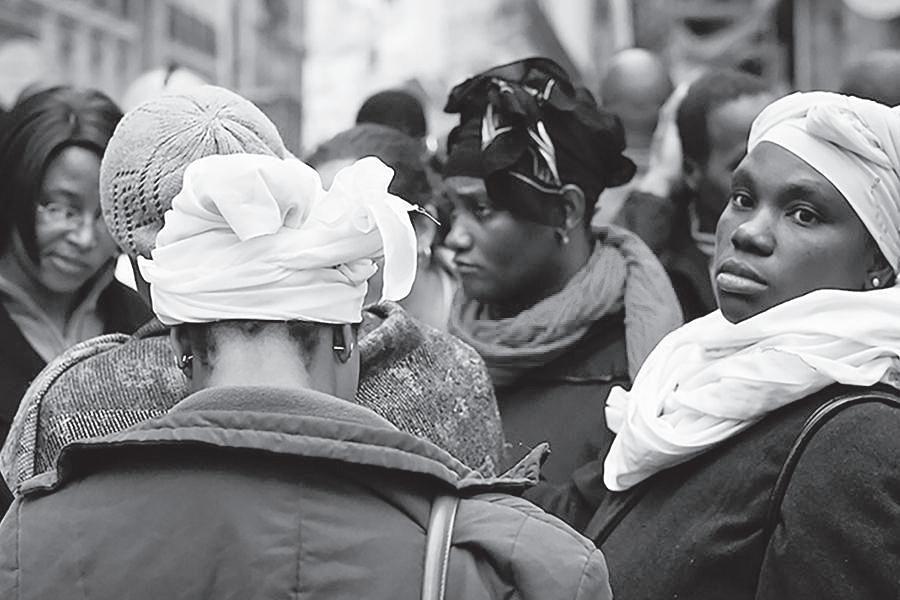
9 minute read
TMU students hopeful about a possible extra reading week
from Vol. 56 Issue 17
KONNOR KILLORAN/THE EYEOPENER
a good feeling,” she said.
Advertisement
Mikayel Baghouzian, a secondyear chemical engineering student at TMU, said a study week in the fall would benefit all students.
“Study break helps out a lot. Just to catch up, get all your work done,” he said.
First-year child and youth care student Tharini Jeyakumar, said an extra week could promote attending class instead of skipping class to study for exams when it’s close to the examination period.
By Ayshat Abdurzakova
With engineering students currently only benefiting from one reading week, some students say that adding an additional one may relieve stress and help their organization throughout the semester.
In its January Board of Directors Meeting (BoD), the Toronto Metropolitan Students’ Union (TMSU) discussed the possibility of an extra reading week, as previously reported by The Eyeopener
Specifically, the TMSU discussed working toward a fall reading week for engineering students, who currently do not have one, according to the university’s website.
TMU’s fall study week is from Oct. 11 to Oct. 14 and the mid-winter break is Feb. 20 to Feb. 24 this year. However, engineering students only observe the winter reading week.
These dates also combine existing statutory holidays—like Thanksgiving weekend and Family Day, respectively.
Alana Teejai, a first-year engineering student, said the lack of free time engineering students have due to their rigorous school schedules can cause stress.
“Every weekend, I’m always busy, I can’t really go out. When I get home it’s super late,” she said.
“An entire week to catch up on things I put away or put off would be nice or [to] just prioritize other things would be nice.”
Amy Zhu, a second-year engineering student, sees the lack of a reading week as unfair.
“I hope they give us a break,” she said. “When everyone else is having fun and we’re stuck at school, it’s not
According to the Canadian Engineering Accreditation Board (CEAB), as of the 2021-22 accreditation cycle, engineering students must complete a minimum of 1850 accreditation units (AU) over the course of a school year in seven mandatory categories. One AU is equivalent to one hour. The student must meet the AU requirements in order to be accredited as an engineer upon graduation.
“This is one of the reasons that you have engineering students, who always start the winter term ahead of the rest. It’s not because we want them to do it, it actually was imposed by the accreditation requirements for engineering,” said TMU president Mohamed Lachemi.
Students in other programs also say that an additional reading week would benefit them.
Leila Boyacheck, a second-year early childhood studies student, said having an additional week on top of the existing reading week would help students organize themselves better for exams.
“I feel like the one week, it’s too rushed,” she said.
“We [the students] don’t know if we should actually go in [to class] and if you’re going to learn something,” she said.
“I would love it…even if it makes the [school] year a bit longer,” said Boyachek.
As of now, some students feel the crossover of reading week and official holidays is troublesome because they have to prioritize their studies over family downtime.
“It is inconvenient that reading week falls on weekends and statutory holidays,” said Boyacheck in a follow-up email. “Many times I feel like I have to choose between family and school.”
In order for an additional study break to be instated, the TMSU must bring forward a plan to the Student Senate, which is a group of elected graduate students, alumni and faculty who discuss and work to improve student life, according to TMU’s website.
But before they can do so, the students’ union said it needs to account for how many students are willing to add an extra week of classes elsewhere in the year.
“Something will have to give in order to make this happen,” said TMSU
“Currently, the TMSU is taking preliminary steps and researching the issue in order to lay the groundwork on how to best prepare future teams to carry on this project,” the TMSU said, in an emailed statement to The Eye Lachemi added that there are many factors to consider when issuing study breaks.
“The reality is that the university semesters are based on curriculum and materials that must be covered in order to achieve the result for each course,” he said to The Eye
“We cannot take any risk to lower the minimum requirements for programs because that can also affect the quality of accreditation or the results of the accreditation from some of our programs,” Lachemi said.
“I will not close the idea of having conversations or consultations, but we have to be realistic about the requirements of programs,” President Lachemi concluded his statement.
Despite the hopefulness among students surrounding this possibility, they are still cautious about getting their hopes up.
“Honestly, will [TMU] even listen to us?” Boyachek said.
“I hope they do for students because I know it can be really helpful for other people. I’m hopeful but I’m realistic,” she said.
By Moyo Lawuyi and Victor Ola-Matthew
When Toluwani Adeniyi first came to Canada in the fall of 2021, everywhere was a reminder that she was Black. There was a stark difference from her home country where most of the population is Black.
“It was a sudden rude awakening,” she says.
Adeniyi, a third-year psychology international student from Nigeria, began to notice that the colour of her skin could now be the cause of several complications in her life, including being able to get a job.
While she doesn’t believe she has experienced outright racism from a person in Canada since moving here in 2021, she admits she might just not have noticed since she grew up in Nigeria and wasn’t very educated about race issues prior to her move.
For some international students from Africa, living in the multicultural city of Toronto proves difficult. Many of them say they’ve experienced racism for the first time, something they never had to worry about in Africa and quickly realize how race affects their everyday lives.
According to the City of Toronto’s action plan to confront antiBlack racism, more than 200,000 people of African descent or origin in the city are affected by racism, making it hard for them to integrate into a new society. In addition to the typical culture shock that comes with coming to a new country, African international students encounter what is for them the strange feeling of being treated differently from their white counterparts.
ing away from their country and in my opinion, they think this is a better bet,” said George.
Dora Antwi Adomako, a former third-year exchange student in the performance production program from Ghana, recounted a racist incident she experienced when she came to Toronto in September 2022. Adomako was at Oakham Café, a restaurant on campus located inside the Student Campus Centre, when a staff member abruptly asked her to leave without a reason. This happened in her first semester as an exchange student.
feel more welcomed,” she says.
According to TMU’s Student Life and Learning Support website, the BSL, located at Kerr Hall West 77A, is “an identity-affirming space on campus where Black students at Toronto can study, heal, relax, gain tools and resources, make new friends and build community.” of this interview, were still waiting for their study permits, which they have since received. George says she has had African students in her classes who were forced to learn online due to their study permit delays.
While racism is prevalent when they enter Canada, some African immigrants also say they start experiencing racial discrimination before they even enter the country. Many African-born students at TMU say they had to wait very long for their study permits despite meeting all the requirements.
During a House of Commons session in May this year, the Immigration, Refugees and Citizenship Canada (IRCC) recognized the racism within its system. Its report stated that in the IRCC, there were “widespread internal references to certain African countries as ‘the dirty 30,’ and stereotypes of Nigerians as “particularly untrustworthy.”

Editor-in-Chief
Abeer “Corn Dog Mod” Khan
News
Jake “On The Ball” MacAndrew Gabriela “Fuck The TTC” Silva Ponte Racy “Guelph Girl” Rafique
Photo
Konnor “From Alberta” Killoran
Vanessa “Froot Loops” Kauk
Kinza “Cover Story” Zafar
Online
Thea “Are You Happy To Be In Paris?” Gribilas
Madeline “Oui” Liao
Features
Stephanie “InDesign Vet” Davoli
Arts and Culture
Shaki “$10 And A Dream” Sutharsan
Business and Technology
Natalie “Redemption Arc” Vilkoff
Communities
Negin “Baby Boss” Khodayari
Sports
Gavin “He’s Baaaaack!” Axelrod Jack “Pizza Anti” MacCool
Fun and Satire
Zarmminaa “Megamind” Rehman
Media
Sonia “Slay” Khurana
Youdon “The Manifester” Tenzin
Despite the racism they experience, African immigration is increasing in Canada. According to Citizenship and Immigration Canada News, Canada welcomed more than 300,000 immigrants in 2022 from the continent, with Nigeria being the fifth top source. Toronto is also a popular destination, with 88,020 African immigrants arriving here in 2021.

Usha George is the former director of TMU’s Centre for Immigration and Settlement and an expert in Canadian immigration. She explains why immigrants from African countries keep migrating to Canada despite possibly dealing with racism that doesn’t exist in their home countries.
George says Canada has fewer racist incidents than other developed countries. In addition, Canada—and especially Toronto—is filled with so many economic opportunities that immigrants are willing to overlook the racial discrimination they will face. “People are looking for the final outcome, for the final goal of mov-
Adomako was perplexed by the sudden request and left to get lunch elsewhere without further investigations to find out the motives of the staff. She had only recently arrived in Canada and was happy she made it, so she was blind to the experience. “It is only now, looking back, that I feel it,” she says.
The Eyeopener reached out to Oakham Café for comment regarding this incident. “This is obviously quite upsetting to hear, we never want anyone to leave the Café or any of our operations feeling this way,” said Crystal Pettman, the restaurant manager.
Adomako says she adjusted more to Toronto’s multicultural climate with the help of her friends, who were mostly white. She also says she didn’t find it hard to meet Black students from familiar backgrounds and experiences when she arrived on campus, with the help of the TriMentoring Program’s Black Students’ Lounge (BSL).
Still, Adomako says she felt they already had friend groups which she found hard to penetrate into.
“The Black Students’ Lounge (BSL) made me feel some sort of belonging but honestly, the white students [in my classes] were always checking up on me and made me
Fred Mammah, a first-year Nigerian chemical engineering student says his visa processing took five months. “They gave no feedback during the entire process, so it was really hard to plan,” he says. Because of the long wait time, he missed his orientation in September 2022 and had a harder time making friends than others.
Visa processing times for African countries are particularly slow. According to the Canadian Council for Refugees, the Canadian visa office in Nairobi, Kenya, which processes visas for 18 African countries such as—Nigeria, the Democratic Republic of the Congo and Uganda—is the slowest in the world. Adeniyi, who was forced to leave China, where she was studying, in 2020 due to the COVID-19 outbreak, says the processing time for a Canadian visitor’s visa from China only took two weeks, as opposed to her parents’ two-year wait for one in Nigeria.
Mammah has friends who have fulfilled all the requirements for their visas since April 2022 yet, at the time
The report said racial biases are a significant factor in the high refusal rates of immigrants from African countries. Since then, the IRCC has pledged to do more to remove racial bias from its system. “If I had a different passport, I believe I would have been given more priority,” says Mammah.
Adeniyi says she has doubts on how to deal with racist encounters as she isn’t a very confrontational person. “I have tendencies to just let it go but the problem is that if I let it go, it could be done to someone else who isn’t as strong as I am,” she says.
Web
Nishil “Bestest” Kapadia Sam “SCC” Chowdhury
General Manager
Liane “Knows Her Shit” McLarty
Advertising Manager
Chris “Buddy <3” Roberts
Design Director
J.D. “Ur The Best <3” Mowat
Contributors
Victor “Board Member!” OlaMatthew
Moyo “Cutest Earmuffs” Lawuyi
Ayshat “Super Studier” Abdurzakova
Sahara “Elle Woods” Mehdi
Asha “Welcome Home” Swann
She suggests that students who have difficulties confronting others after dealing with a racist encounter could report the situation to their professor and ask to be kept out on the loop of the matter. She says for some international students at a social disadvantage like those with social anxiety, confronting racism may be difficult while for others it may not be. But if they don’t speak up, whether through email reports or in person, another international student is bound to have the same experience.
“If it’s within your power, say something,” says Adeniyi.
Denise “Pitman Caf” Xiao Kaden “HIM” Nanji
Bana “Charles Kissi” Yirgalem
Matthew “Out of Nicknames” Lin
Mitchell “Sweet Time” Fox
Todd “Thunder > Packers” Ash-Duah
Ella “Girlypop” Miller
Maryam “Password Sharer” Ahmed
Reina “Ollo?..Hello?” Chaiekh
Paloma “Pulled Through” Torres
Bana “On It!” Yirgalem
Yumna “Miss Dedication” Kamran
Mikhaylo “Editorialize” Batashov
Julia “Agust D Tix” Lawrence
Edward “Snoward” Djan
Oceanne “Sleepy” Li
Mega “Fashion Icon” Mind Metro “Music” Man








